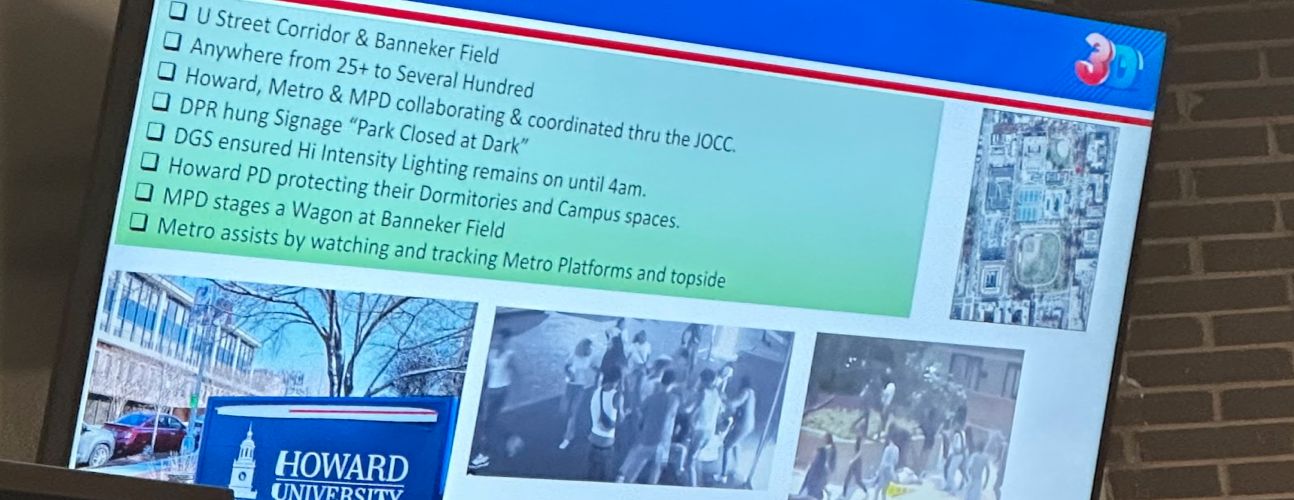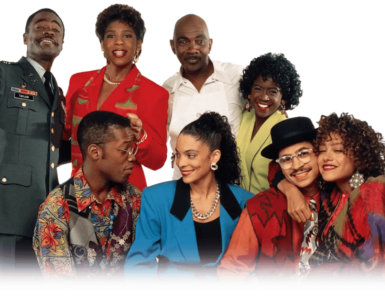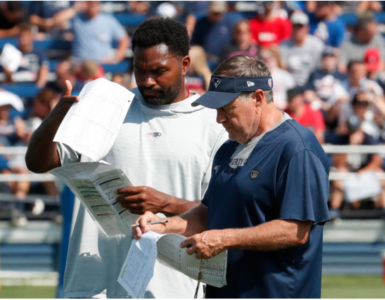The D.C. Metropolitan Police Department of Washington’s third district, held its monthly Citizens Advisory Council meeting on Aug. 31. The Department shared its response to reports of youth violence near Howard University’s campus, including lighting areas at night. (Myahna Alston/101 Magazine)
Amidst an upsurge in youth violence on Howard University’s campus and surrounding areas, the university addressed ongoing safety concerns at a parent and student Town Hall Aug. 22, informing the community about increased safety measures gradually being implemented on campus as the semester progresses.
In order to reconcile the relationship between Howard University Department of Public Safety (HUDPS) and the Howard community, the University hosted its annual Safety Fair on Aug. 17. It’s an event where HUDPS and D.C. Metropolitan Police Department security officials, along with other safety agencies and organizations attend to inform students about safety protocols and impart safety tools to students.
There are seven police districts in the District of Columbia. The D.C. Metropolitan Police Department’s Third District operates within eight service areas, which includes Howard University and the surrounding community – more specifically, U Street, where a 16-year old Maryland native was stabbed by another teenager on Sunday, Aug. 27.
Just weeks before, on Aug. 14, a physical altercation took place outside of the East and West Towers dormitories located on campus. With nearly 25-30 local area youth and 50 Howard students involved, one student was stabbed and subsequently hospitalized, while others were injured. Back in July, police also reported an arousal of safety concerns after a 14-year-old driving a stolen vehicle killed a construction worker on campus, after attempting to rob him.
101 Magazine attended a monthly Citizens Advisory Committee Meeting on August 31, at which the district’s community and public safety leaders – including James Boetler, Commander of the MPD Third District – met to discuss recent safety issues, including juvenile crime.
Mayor Muriel Bowser responded to the upsurge in juvenile crime throughout the city, by announcing the enforcement of a citywide Curfew Enforcement Pilot beginning on September 1. Cmdr. Boetler elaborated on Mayor Bowser’s announcement, saying, “We already have a curfew in D.C. That’s nothing new. It’s not a new initiative.” He clarified, however, that the Mayor’s announcement simply emphasizes “the MPD’s focus on 7 areas where public safety officials have noticed the uptick in juvenile crime.”
Along with Howard University and Banneker, these seven areas of focus include Chinatown and Navy Yard, the U Street Area, and others listed on the District of Columbia Government public website.
Cmdr. Boetler went on to describe one big issue with the city’s curfew: the lack of consequences juveniles face for breaking it.
“Curfew is not a criminal offense. I can’t put [my] hands on a child because he’s under the age of 18 and out after midnight. In fact, I can’t use [the police] force on him to stop him to ask him if he’s over the age of 18. We don’t have an ID law in D.C. You don’t have to carry your ID.
“So if I stop you, and you say you’re over 18 or 21, I can’t prove otherwise, unless I know you. If you’re not voluntarily giving into our curfew ban, so we can take you home, and you run away, we are not chasing you. We are not tackling you. That’s a misconception.” Cmdr. Boetler explained.
The commander also acknowledged that, since the notable rise in crime, president-appointed U.S. Attorney for the District of Columbia – Matthew Graves – has spoken on behalf of his office’s commitment to prosecute juveniles at the age of 16. However, Boetler still encourages community members to press judges and Graves to properly punish youth once they are in custody.
When asked about emergency response protocols in areas near Howard University’s campus, Cmdr. Boetler noted that after the altercation outside of West and East Towers, the MPD reached out to DC Department of Public Parks & Recreation (DPR) to request that a sign stating “Park Closed At Dark” be hung up, and the lights in Banneker Park be left on after the park’s scheduled closing time to deter juveniles from gathering there in large numbers.
The commander noted that robust responses from the MPD have slightly reduced large youth gatherings in the area. “In the weeks since, we’ve only had small amounts of 25-30 [people] show up on U Street. We babysit them,” Cmdr. Boetler said.
Additionally, he explained that another one of the MPD’s intentions moving forward is to participate in community engagement, especially by using the presence of police officers to deter juveniles spotted on U Street during peak nightlife hours. That way, he hopes youth breaking curfew or looking to be troublesome will be aware that they’re being watched.
HUDPS Safety Measures on Campus
Recently, HUDPS began increasingly promoting the POM initiative as a part of its Bison S.A.F.E plan, which involves the university distributing over 2,000 handheld P.O.M. or “HU Peace of Mind” devices to students, faculty, and staff within the Howard community. Through the devices, students and community members are able to call campus safety officials and emergency responders for help during an unsafe situation in three clicks, without the use of a cell phone. Once activated, the POM device will put users in touch with dispatchers who may access the users’ exact location.
Another way students and stakeholders may complete emergency calls if needed, is through the BisonSafe App. Cmdr. Boetler expounded on the dispatching process when someone in the District – for example, a student – makes an emergency phone call.
“D.C. is different. In D.C., MPD doesn’t have dispatchers. There is a whole separate government agency called the Office of Unified Communications that’s based out of a separate facility. So when you call 911, that’s who you’re getting–dispatchers who work for the OUC with a director. They then in turn, based upon our criteria, prioritize calls and dispatch them through a CAD (computer-aided dispatch) system to MPD. So they’re a partner in this, but they’re not MPD,” he stated. “Sometimes, there is a lag time; and for important stuff, it’s in seconds… People are unaware that somebody, not a cop, prioritized it, and it just took that long to dispatch it to us.”
One student at Howard, who wished to remain anonymous, attested to her successful experience seeking safety in the HUDPS after experiencing an uncomfortable encounter during which a young male repeatedly made sexual comments towards her, leading her to register for a POM device.
“I took summer classes and there was an incident with some creep on campus, so I spoke to the HU Police Department and they directed me to the people who gave them to the students. When I went in to talk to them, I told them about the incident and they gave me the device. The registration process was fairly quick and easy. They walked me through it, honestly.”
She added, “The only part I didn’t like is that they told me they couldn’t directly handle the situation and it had to be the D.C. Metropolitan Police Department, and they said the best they could do was give me the POM.”
According to the source, it was later revealed that the male was a local resident and not registered to take any classes at Howard University at all.
Details on the HUDPS & MPD Partnership
101 Magazine asked Cmdr. Boetler about the nature of the MPD Third District and HUDPS’s partnership for the joint purpose of securing the Howard University campus area.
“Howard University Police Department is responsible for all calls on campus, to any of the campus-owned buildings such as the dormitories and so-forth…so Georgia Avenue, the thoroughfares that run through and around campus are public streets. Public streets fall in the purview of the Metropolitan Police Department,” Cmdr. Boetler explained. “Although HUPD has authority to make an arrest, we usually respond to any call on campus of a serious nature. We’re also going to assume the investigative responsibilities.
“So, we’ve opened up a dialogue. We got assistant chief of Howard University Police Department, Alvin Lide. Me and him talk, probably twice a week. It’s a ‘hey, what’s going on, what are you guys seeing?’ We talk about any crimes that occur within the outer area of Howard University, just for awareness. He’s reached out to me this past week to ask us to do some training for his officers,” Boetler concluded.
According to Boetler, the degree of training and experience within the MPD is not mirrored in the practice of HUDPS security officials. In the upcoming months, the MPD Third District will be conducting training for HUDPS security officials.
“The one thing we came to agreement on was, their officers need to be on property protecting those students. We’ve asked them to be much more intentional about their deployment. I think since the incident, they have been. We’ve seen much better communication between us and them,” Boetler said in reference to the suggested security approach the MPD has given to HUDPS.
Following the increase in youth violence on campus, and in addition to the POM initiative, the university has increased staff and security personnel presence on and around campus, as promised in the letter from President Wayne A. I. Frederick. Additionally, upon entering the campus dormitories, students are required to state their name and room number and show their Bison ID, for added safety.
Students Input on Feeling Safe on Campus
A few Howard University students expressed feeling an improved sense of safety due to the measures, including freshman Psychology major, Olivia Jackson.
“Me and my friends all received our POM devices. Regarding the safety on campus, I feel pretty safe. Especially in my dorm–knowing that they also ask every person that comes in for their name and room number is reassuring. It’s a little scary that we get emails every week about a carjacking or robbery on campus, but I feel like the campus does a pretty good job of trying to be as safe as possible,” Jackson said.
In the campus-wide emailed letter following safety reports and concerns, President Frederick also announced that the University will be reconstituting the Campus Safety Council. 101 Magazine reached out to Howard University Department of Student Affairs for an update on the Campus Safety Council initiative and did not receive a response.
In the aforementioned letter from President Frederick, he acknowledged the installation of more than 1,000 cameras on Howard’s campus in the upcoming months. The planned safety measure has become a major element of the collaborative effort under the HUDPS’s recently bolstered partnership with the MPD, according to Cmdr. Boetler.
“One of the collaborative [efforts] is that they’re [HUDPS] going to patch that [cameras] into our system, so that when something happens, our folks can get up on those cameras live and find the bad guy,” Boetler stated.
When asked whether MPD was currently patched into any cameras on Howard’s campus, Boetler admitted that while the department is not, the MPD owns police crime cameras in various locations throughout the district that they may view live if a crisis occurs, or after crimes are committed for evidence purposes.
Cmdr. Boetler concluded by saying that he will continue speaking with newly-hired HU Assistant Police Chief Lide on their weekly calls, and make a point to ask about the POM devices. As for relations between the MPD Third District and the Howard community, he mentioned that he wishes to continue fostering that relationship.
“One of the things that we’ve been doing… I have a four-person community outreach team. Their sole job is to do positive engagement. They don’t go to calls for service. They just go around the city in the district and do engagement activities. I want to find more opportunities to do that,” Cmdr. Boetler pointed out. “I’m not a Bison, but you all are in my district, so I feel like an honorary one,” he joked.
For more information on safety initiatives and protocols being enacted on Howard University campus, and to view updated safety announcements, please visit the HUDPS homepage.










Recent Comments